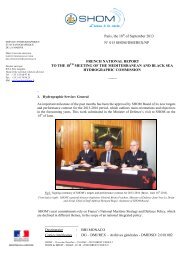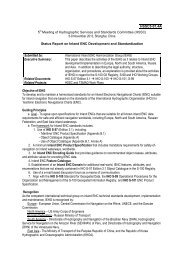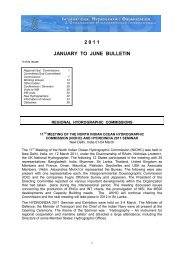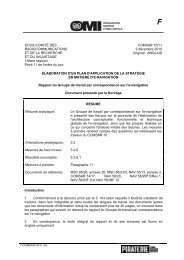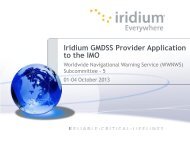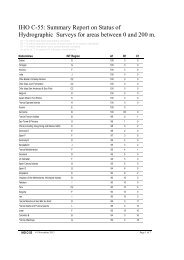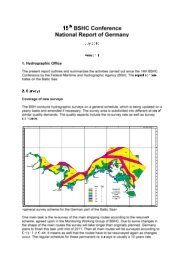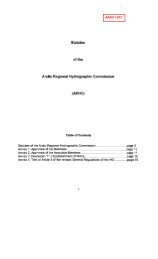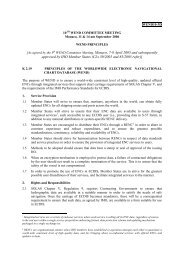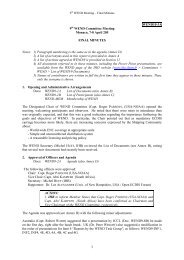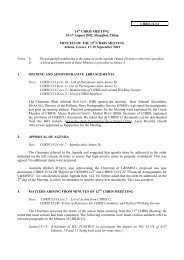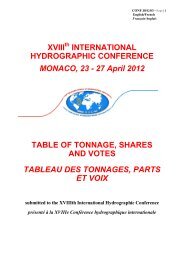Report - IHO
Report - IHO
Report - IHO
You also want an ePaper? Increase the reach of your titles
YUMPU automatically turns print PDFs into web optimized ePapers that Google loves.
9<br />
Seminar assessment and conclusion<br />
The seminar chair thanked the speakers for their thorough presentations.<br />
In accordance with procedure 5 developed by the <strong>IHO</strong> Capacity Building Sub Committee<br />
which provides guidelines and rules to assess the performance and success of all Capacity<br />
Building efforts, the chair organized a wrap-up session to collect feedback, to determine if<br />
participants expectations were met, to asses the seminar and to identify future perspectives.<br />
As the assessment should be carried out according to performance indicators rated on a scale<br />
from 0 (low) to 5 (high), attendees from developing Coastal States were requested to evaluate<br />
the following points.<br />
Question 1: Did the seminar raise the importance of safety of navigation and are you aware of<br />
this issue?<br />
All polled people gave a five. Nevertheless most participants were already aware of this issue<br />
and of the national obligations under SOLAS Regulations.<br />
Question 2: Will this seminar help you in the establishment or development of a hydrographic<br />
infrastructure in your country?<br />
All polled people gave a five. Most countries have already established a hydrographic<br />
infrastructure; the issue is to determine a roadmap to go further. Several countries raised the<br />
difficulty to be recognized at the governmental level as a proper hydrographic institution. The<br />
practical issue is a permanent need.<br />
Question 3: What are the next steps to consolidate what already exists?<br />
Angola: organization of a SAIHC Conference in Angola to raise national authorities’<br />
awareness, reporting on progresses following the technical visit two years ago.<br />
Comoros: establishment of the service itself and outside assessment through technical<br />
visits.<br />
Madagascar: access to training and equipment.<br />
Malawi: assistance in training required (software update and equipment) and funds.<br />
Mauritius: training (especially for very shallow waters in lagoons) and equipment.<br />
Mozambique: outside assessment to evaluate which strategy to meet <strong>IHO</strong> standards<br />
(S44, S57).<br />
Namibia: organization of the visit of IHB in Namibia upon invitation (IHB to contact<br />
Namibian authorities and details to be provided by Namibia) and training (category A<br />
hydrographers).<br />
Seychelles: manpower allocated for hydrography and budget, continuous support for<br />
awareness at the government level.<br />
Tanzania: raising Tanzanian authorities and government awareness about the needs of<br />
hydrography, whereabouts of the head of the national hydrographic committee (Dr<br />
Dubi?).<br />
It was noted that supporting nations in the region may not be able to sustain nine additional<br />
hydrographic offices. Only a regional approach in term of co-operation will help Coastal<br />
States in the SAIHC region to meet their maritime obligations. Mutualization of efforts and<br />
equipment will permit a gain of productivity for countries that have common interests.<br />
In term of Capacity Building, the regional approach appeared necessary for all participants,<br />
nevertheless the training and the development of hydrographic infrastructures required to<br />
support particular needs and national specificities must be taken into account to bring a<br />
benefit to all. A better understanding of the local needs can be achieved through the <strong>IHO</strong><br />
9



